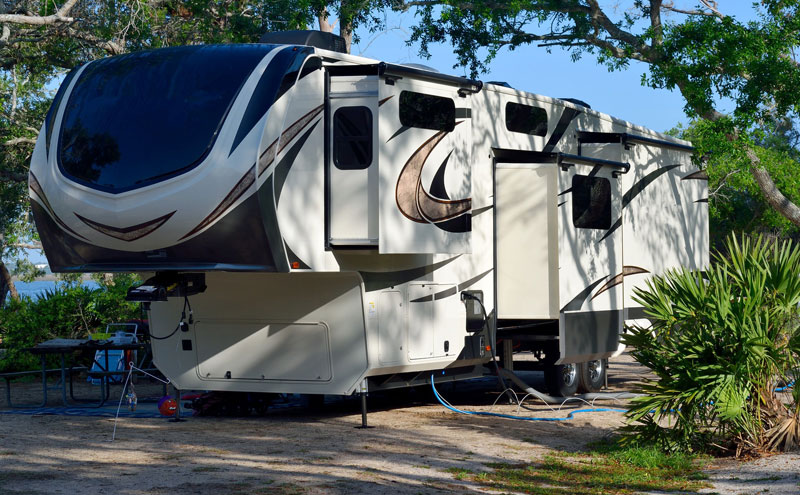You can expect an average 5th wheel weight to be about 10,824 pounds (4,910 kg).
When looking at the specs for different 5th wheels, the weight will also be listed as dry or wet weight. Dry weight refers to only the frame of the trailer without fuel or belongings. When the gas tank is full, and all of your belongings included, that is known as wet weight.
For pulling 5th wheels, it’s recommended to use a truck that can tow at least 10,000 pounds for the lightest 5th wheels. This would account for the additional weight of passengers and cargo. The average F-250 truck can handle a towing capacity of at least 12,300 pounds depending on your model.
Of course, you’ll need a bit more torque and towing power if you plan on towing a longer one with you, or if you’ve got a heavier trailer with slide-outs. You may even want to go up to an F-350 equivalent dualie for additional power with a 5th wheel.
Make sure to check your vehicle’s towing capacity. This can be found in your owner’s manual or the manufacturer’s website as your gross vehicle weight rating (GVWR).
7 Example 5th Wheel Weights
The following chart features example 5th wheel weights of specific models ranging from the lightest to the heaviest used on the road. Additional details can be found on the manufacturer’s websites. Here’s the 5th wheel weight chart:
| 5th Wheel Model | Estimated Dry Weight |
| Forest River Arctic Wolf 251MK | 7,318 lbs (3,319 kg) |
| Jayco Eagle HT 27.5RLTS | 8,100 lbs (3,674 kg) |
| Forest River Arctic Wolf 321BH | 9,288 lbs (4,213 kg) |
| Jayco Eagle 321RSTS | 10,815 lbs (4,906 kg) |
| Keystone RV Montana 3120RL | 12,056 lbs (5,469 kg) |
| Jayco North Point 387FBTS | 13,325 lbs (6,044 kg) |
| Grand Design Solitude 380FL | 14,866 lbs (6,743 kg) |
Sources: Forest River, Jayco, Grand Design, Keystone RV
Additional Weight and Trailer Options
The additional weight you will encounter with a 5th wheel will come from a few areas. Those areas being storage, add-ons, sleeping areas, kayaks or bikes, and propane gas (wet weight). This creates an additional weight to consider when towing and traveling with a 5th wheel.
Make sure to refer to your vehicle’s owner’s manual and read the section on towing capacity. It’s always safer to leave some extra wiggle room to not damage your engine.
To Conclude
5th wheels provide a great mode of living out on the road, whether that’s on at a national park or campground. Each make, model, and size comes along with its own weight based on use and if any mods are installed. The key factors to consider the weight of a 5th wheel come down to:
- Length
- Slide-outs
- Construction/material
- What’s stored inside
- Fuel tank/gas propane
It’s important to know the correct weight when looking to tow and transport your 5th wheel. If you’re unsure and want specific weights, you can always check the manufacture’s website or go to a local cat scale to get a more accurate weight.

